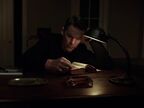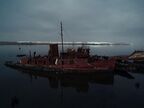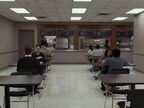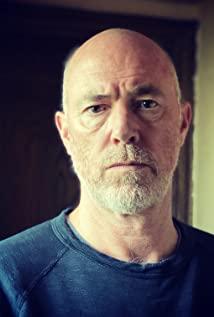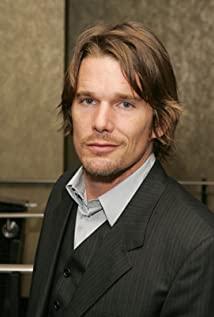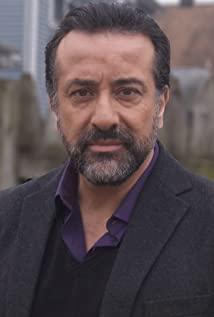Compared with the maverick and dazzling "Diary of a Country Priest", what the First Reformed Church lacks is the strange taste of Jansenism.
Keywords: pastor's diary; church of Dutch immigrants; industrial city; increasingly harsh environment
Presumably, viewers with a little experience can see a lot of Bresson 's clues from this film . If the film has not been influenced by any village priest, it is definitely self-deception. We can even see this similarity or inheritance in the narrative symbols hidden in the story-the Dutch church built in the colony in the late 17th century contains the history of the church that was suppressed by Jansenism (here Don't expand it, Baidu by yourself)-but need to expand the Jansenist ideology a little bit: in simple terms, it is to believe that man's original sin is not self- atonement and that man's depravity is not self-help. God's grace has nothing to do with man's free will. The salvation of people is preselected by God. All in all, it emphasizes grace and destiny. Understanding this point is an important basis for understanding this film.
Now that the "Diary of a Country Priest" has been mentioned, it is necessary to mention the French writer Bernanos who deeply influenced Bresson's creative thoughts ("The Diary of a Country Priest", "Under the Sun of Satan", "The Girl Muchet Special "). His writing is permeated with strong Jensenist criticism. For the sinister life and the depravity of people, the characters in his works often become victims who are both shocking and insignificant. Whether it’s the village priest or Muschett, they are suffering from the world’s unparalleled malice—they still believe in kindness, morality, and simple faith—they cannot live unscrupulously and freely like landlords and hunters. In fact, they yearn for death-the grace of salvation. This is even more obvious in the country priest-and is also borrowed from the film.
This scene is exactly the same as the scene of a country priest dipping wine and eating bread. It can be seen as a tribute or as a spiritual continuation of narrative temperament. The inner quality under the image coincides with the Jansenist theory that the priest who blames himself relies on alcohol to numb himself all day long. On the other hand, the pastor often wakes up in the middle of the night and before dawn, and then solemnly records his dialogue and confession with God and the truth.
Here, the film prefers to use metaphors to realize it more than Bresson, but it is not very smart. The diary, the wine glass, the proof of sacrifice, and the key to the church together constitute a closed interpretation: the priest living in the Garden of Gethsemane, day after day, is immersed in sorrow and cannot help himself.
This sensitive and cautious pastor wore a bleak and melancholy color as soon as he appeared on the scene. Although his job and task were to enlighten a radical environmentalist, he later thought that this was actually an extremely difficult task. With the suicide of environmentalists, the pastor was involved in a series of spiritual crises. The only profitable factory owner, the exquisite head of the large church, the female church worker who has been showing up frequently, the poor widow, and a series of urgent matters to be handled by him personally-the 250th anniversary of the church; repairs; funerals and growing Deteriorating environmental pollution-even more squeezed it into the corner.
The pastor rushes around in such and other affairs every day that he even neglects his own health...
He began to drink heavily. He began to hate. He began to make a plan. He sent away poor Mary and told her not to come to the memorial...
The priest took out the battered vest. The commemoration started as scheduled, and the pastor put on a self-explosive vest. Then, he suddenly discovered that Mary was coming...
We must now go back to the perspective of the "bad guys". Was the fellowship leader wrong to enlighten the pastor? No, it makes sense. So is the factory owner’s accusation against the pastor reasonable? In fact, it makes sense—especially considering the basic principle of separation of church and state, the plan that the pastor is affected and decides to blew himself up is really extreme, isn’t it? Although this extreme choice is a response to the increasingly corrupt outside world, it is still blind and non-constructive destruction. The life and death of a factory owner cannot change the social problem of environmental pollution, but the self-destruction of a pastor will cause more social conflicts. So, does it mean avoiding or even retreating to the problem? Not so. The responsibility of the pastor is not to protest, nor to appease, but to spread the gospel by maintaining neutrality and accepting more people-otherwise the pastor will become a revolutionary directly involved in the social process. From this point of view, the pastor does "do not understand God's will", although he is engaged in church work. Once again fall back to the fatalistic thought of grace.
However, although the priest had a serious gastrointestinal problem-the doctor answered him like this. "There is a great way to treat cancer now"-yes, it's not the last century anymore. The depraved and incorrigible French countryside in the eyes of village priests has become history. The destruction of the war and the rise of various civil rights movements after the war completely separated the history of mankind from the past. Pollution continues, but environmental protection voices and actions are also expanding. People are still oppressed by power and money, but people have taken to the streets... It is conceivable that Jansenism has been ostracized within the conservative Catholic Church. Because this concept of denying human initiative and the role of free will, although it can stabilize the social order, in the long run, it denies and suppresses humans themselves. If this concept becomes popular, the results can be imagined.
As a result, we saw an exciting ending-returning to the movie itself, this ending is both sensible and reasonable and shows new meaning through the contrast with Bresson.
The appearance of Mary broke the fate of Jansenism—and also broke the hatred in the pastor's heart. It goes without saying that the source of his hatred came from his son’s vain death in Iraq-the "wonderful death" used here is after some consideration-even for the pastor from a patriotic family who has served in the military for generations, he himself admitted the war. The nature of "unethical" and the disillusionment of the family caused by it. The wife can’t forgive her husband for encouraging his son to join the war, and the pastor can’t forgive the mistakes she has caused (and the suicide of the environmentalists in the film). This sense of guilt, self-blame and guilt directly caused the pastor’s melancholy and sensitive "suffering" in the church. Repair (drinking)" life.
When the pastor first appeared in Mary's house, he confronted the suicide, occupying both sides of the picture. Although, the pastor was opposed to the policy out of his own responsibility, but in essence, the pastor was very clear in his mind— In the face of the firm beliefs of environmentalists and the power of action derived from this belief, I am just a self-pitying and pitiful creature hiding in the "First Reformed Church". This has been demonstrated in his unremitting diary writing. This diary, which he called "at a certain moment" to be destroyed, is just a record of his confrontation with God. It was the source of his attraction to Jansenism that he couldn't wait to start his actions-now, let's talk about the self-exposure vest. The first appearance of this prop was before Mary's husband committed suicide. It appeared for the second time when the pastor was led to a dead end by environmental issues.
The pastor's hesitation, weighed repeatedly against the background of the miserable world, seemed even more moving and more frightening. Facing such a tragic situation in the outside world-he couldn't help but think of war and his son who was killed by war. Action must be taken! The screen issued such a call.
So the pastor began to make his own plan or fulfill the unfulfilled responsibility. "...By 2050, human beings will face the extreme deterioration of the earth’s environment." Such realistic predictions obviously persuaded the pastor and prompted the pastor to start acting-but as sharply criticized by the head of the fellowship, "How do you know that God does not want to Destroying mankind?" The last time God destroyed this terrible world took 40 days and 40 nights-the pastor did not take the job of a "priesthood" but a personal action of a "conscience, awakened person". Blast vest. Even in the Quran, there are no words that encourage suicide. The actions of the "jihadists" are their own misinterpretations and personal actions (this is the political correctness in the relationship between Islam and terrorism-it is not quoted because it is indeed correct). God does not know whether a person is praying when he decides to commit suicide, just as in the Jansenist view, the salvation of a person is only by grace and absolutely unknown. In this way, Mary's appearance at the end is just a cinematic ending, a good ending, a suspenseful release...but it cannot be used as a prerequisite for the priest's own alienation to be resolved. The priest's plan to blew himself up even if it cannot be realized or even committed suicide because of Mary's appearance. The last hug in haste only resolved the film contradiction that the priest did not have to die, but it did not fully clarify the spiritual predicament of the priest freed from self-alienation. Has he been waiting for such an opportunity? Isn't the poison (cleanser) he shed after seeing Mary's appearance a manifestation of his abandonment of his "sacred plan", or is it that he has given up his voluntary will to "cleanse" his guilt all the time.
In fact, the pastor Bengen fulfilled his "priesthood"—whether in the army or in the First Reformed Church, he fulfilled only the traditions of his patrilineal family. Love the country and love the religion... And the tradition of this ancient colonial church where he lives, doesn't it mean that sin never provokes evil? Pollution can be seen everywhere around towns, and the billowing chimneys seem to be telling them-but which one is more important than the convenience brought by industrialization, employment, development and environmental damage? Without these chimneys, the priest can’t drive. The pipe organs of his church need to be repaired and repairers exist because there are manufacturers producing such instruments. So some people are willing to produce pipe organs because most people can eat and have water. On days with electricity...Even lunches for the homeless need electricity, gas, and transportation for food. But the environment was destroyed. The farming community that originally surrounded the First Reformed Church has become what it is now. There were asphalt roads and street lights. Is this also wrong?
The priest riding on the bicycle showed a natural smile—a real smile instead of an embarrassing dry smile when facing the fellowship leader and factory owner. Is it because the priest is following the woman at this time? No, does the pastor really hate fellow fellow workers? Yes-because he can't overcome the religious atmosphere that recognizes and recognizes each other in the fellowship-the symbolism of repression and restraint bothers the pastor. This is not a question of women's beauty or ugliness, nor is it a question of the pregnant Mary symbolizing the Virgin Mary. Rather, the pastor puts himself into an inseparable spiritual dilemma. The more he believes in God, the more he believes in the Bible, the more he is obscured by his own obsession and blindness. Therefore, only when the pastor faces the Marys who are more determined than his beliefs, his pride/inferiority, piety/blindness will be temporarily suppressed. He had to stand in a position lower than the Marys and talk to them about God; talk about the truth. In fact, the entry point for the pastor to accept the belief in environmental protection was the absolute shock that the suicide brought him. The pastor believes he is guilty, but he is just drunk!
As a symbol of Mary, of course, it does not only contain religious implications. It goes without saying what the overly obvious hint of body shape means to the Christian world. But the last hug and kiss did not necessarily mean their love. Rather, the role of Mary is to a large extent the reflection in the mirror of the priest. The kissing scene is really a reconciliation between the priest and the self. Mary, this weaker and stronger woman is the reflection of the man in the mirror. Her weakness caused all the damage inflicted on her to be digested and rebounded back. No one doubts that Mary is not because she appears too few times or lacks interaction with others. It is because Mary is the reflection of the pastor—a wounded person who does not cling to the Jansenist creed.
The pastor can also start a new life. So the end is that he finally walked out of the Garden of Gethsemane.
So far, "The First Reformed Church" has walked out of Bresson's shadow, and even out of the dark land of Jansenism. People who crossed the ocean did not go to the North American colonies for suffering. They did not board the sailboat with the determination to decontaminate. These ancestors only thought about one thing: to live; to escape from war and persecution in Europe, and then to live. They don't know what kind of situation they will face. They don’t know what God’s intention is? Of course they also care about faith, but they have to face life first.
View more about First Reformed reviews



